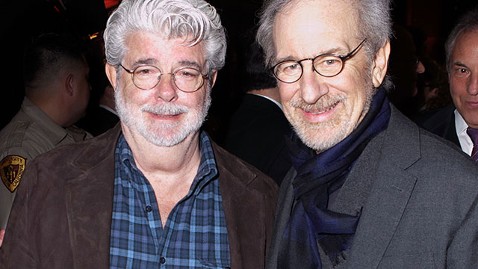Movie Theater Ticket Prices Could Reach $150, Says George Lucas

George Lucas and Steven Spielberg attend the dedication of the Sumner M. Redstone Production Building at USC in this Feb. 5, 2013, file photo taken in Los Angeles. (Image credit: Gabriel Olsen/FilmMagic/Getty Images)
"Going to the movies is going to cost you $50, maybe $100, maybe $150," says George Lucas, the creator of " Star Wars" and founder of Lucasfilm, which is now owned by the Walt Disney Co., ABC's parent company.
Lucas and director Steven Spielberg talked about the future of entertainment while on a panel at the University of Southern California Thursday.
Spielberg said studios were increasingly putting money into "mega-budget" movies, causing a tectonic shift in the entertainment industry.
"There's eventually going to be an implosion, or a big meltdown," Spielberg said. "There's going to be an implosion where three or four, or maybe even a half-dozen mega-budget movies, are going to go crashing into the ground, and that's going to change the paradigm."
Spielberg said his own Oscar-nominated movie "Lincoln" was "this close" to being produced for HBO.
Michael Corty, senior equity analyst at Morningstar, said Spielberg's comment highlights the success of HBO over the years, and cable networks' ability in general to allow for longer storytelling and in-depth character development. The HBO series "Game of Thrones," based on a book series, is one example.
"If you have an idea where you can delve into characters with a longer time frame, it's more economical to do it on cable, and it's faster," Corty said.
"Behind the Candelabra," the recent HBO movie about the life of pianist Liberace that Steven Soderbergh directed, was a relatively low-budget movie with strong star power intended for adult audiences that hit homes instead of theaters.
The historical drama "Lincoln" was nominated for several Oscars this year. Daniel Day-Lewis won for best actor, and the movie itself won the Oscar for best production design.
"If Spielberg has an idea like 'Lincoln', he would have never considered in the past something like HBO, but HBO has done such a great job and has a long history of monetizing content in a fantastic way," Corty said. "It's an option maybe he wouldn't have thought of 10 years ago."
Spielberg implied that movies with bigger budgets might cost more to see in the theater.
"You're going to have to pay $25 to see the next 'Ironman.' And you're probably only going to have to pay $7 to see 'Lincoln,'" Spielberg said.
Corty said differentiated pricing according to the movie's budget makes "economic sense."
"[Spielberg's] example seemed extreme at the high end, " Corty said, "but it makes sense that over time, you would have differentiated pricing depending on the film."